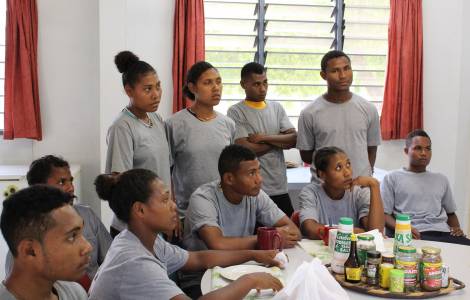
Wabag (Agenzia Fides) - "Tribal conflicts are deeply rooted in the remote province of Enga, Papua New Guinea. In the past, fighting was the final word in resolving conflicts, mainly territorial ones," Father Giorgio Licini, a missionary of the Pontifical Institute for Foreign Missions (PIME) and Caritas collaborator of the Episcopal Conference of Papua New Guinea and the Solomon Islands, told Fides.
The missionary recounts a situation that the Catholic community is trying to contain: "The roots of tribal conflicts are still emotional. What is done to one member of the tribe is done to all. It is the result of an 'excess of solidarity' and the individual's identification with the group," explains the missionary. "This is even more dangerous today, as injustice is often caused by widespread alcohol and drug abuse. A trivial fight can result in multiple deaths and the loss of property, regardless of the reasons for the dispute. The clan supports its members regardless of the propriety of their actions. Traditional conflicts over land have now given way to disputes over property in general and, related to it, over elections and political power. The world is changing, but traditional attitudes remain. Defending the tribe's honor is considered fundamental," Father Licini notes.
The impact on politics is clear: "When a candidate wins a seat in the provincial or national parliament or a ministerial post, it brings immense benefits to the tribe or clan of origin.
In Enga province, politics and the concurrent elections are accompanied by fraud, violence, and bloodshed, not least because of the proliferation of heavy firearms, likely smuggled from the neighboring Indonesian province of West Papua."
The missionary recounts one example: "The suburb of Paiam in Porgera is practically a ghost town after tribal fighting erupted in 2020. This year, only forty believers were able to attend Easter celebrations at the local Catholic parish of Blessed Peter To Rot, once a thriving community center. In the past, it was the wealth of land and livestock that determined a tribe's pride. Today, it is business and political prestige. When I first traveled to the Enga region in 2019, there were few areas where tribal conflicts began. Now it is a dangerous war zone. Homes, businesses, schools, hospitals, and churches have been lost." In this context, as Justin Ain, Auxiliary Bishop of the Diocese of Wabag in Enga Province, notes, the local Church is actively committed to preventing and combating all forms of violence, with the goal of "disarming hearts and hands." Not only by "simply helping the victims," but above all "with education and awareness." The bishop explains that "especially with the resources and teams of the diocesan Caritas, they organize meetings with the village population, especially with young people, who are often completely uneducated or illiterate, and make them aware of the consequences of their violent acts for themselves and their families, as well as the damage caused by alcohol and drug addiction, thus discouraging them from expressing their frustration through violence." The local church is also working long-term, also in view of the national parliamentary elections in May 2027. Enga has six representatives elected in five districts. Elections in Papua New Guinea, and particularly in the Highlands region, are notorious for being marred by intimidation, vote-buying, and fraud during the voting process. "Recently," the bishop reports, "we invited leaders from all walks of life to a three-day political training course on leadership, representation, and accountability to voters. Because it is from them, whom we consider leaders, that disarmament and non-violence must emanate." Enga Province in Papua New Guinea has seen repeated outbreaks of political violence in recent years. Although the tensions are often linked to disputes over access to and use of natural resources, they also reflect ethnic and cultural conflicts, often related to competition for resources, land ownership, and access to government services. In 2024, approximately 30 people were killed in tribal clashes in Porgera, Enga Province, involving 17 tribes.
The recurring conflicts, characterized by brutal violence and cyclical reprisals, reflect deeper, systemic problems. One conflict was resolved by a ceasefire, the so-called "Hilton Peace Accord," signed last year in Port Moresby. (PA) (Agenzia Fides, 16/5/2025)
 ASIA/LEBANON - General Abagnara (UNIFIL): “The Pope’s visit confirms us in our peacekeeping mission”
ASIA/LEBANON - General Abagnara (UNIFIL): “The Pope’s visit confirms us in our peacekeeping mission”